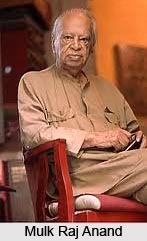 `Confession of a Lover` by Mulk Raj Anand probes the interrelatedness of autobiographical details and fictitious renderings of authorial search for truth. Analyses the thematic cohesion of Indian writing in English centered upon a quest for identity. This deals with the concept of alienation from traditional Hindu society and values as the fundamental motivation for Indian intellectual`s pursuit of the meaning of self.
`Confession of a Lover` by Mulk Raj Anand probes the interrelatedness of autobiographical details and fictitious renderings of authorial search for truth. Analyses the thematic cohesion of Indian writing in English centered upon a quest for identity. This deals with the concept of alienation from traditional Hindu society and values as the fundamental motivation for Indian intellectual`s pursuit of the meaning of self.
Mulk Raj Anand is popularly known as an Indian novelist, short-story writer, and art critic. As he used to write in English he was among the first writers to render Punjabi and Hindustani idioms into English. Called the Zola or Balzac of India, Anand drew a realistic and sympathetic portrait of the poor of his country. The author was also regarded as one the `founding fathers` of the Indian English novel. Mulk Raj Anand was born in Peshawar. His parents were Lal Chand and Ishwar Kaur. Anand rebelled early on against his father`s subservience to the British authorities. His first texts were born as a reaction to the trauma of the suicide of an aunt, who had been excommunicated for dining with a Muslim woman. An unhappy love for a Muslim girl, who was married, inspired some of his poetry. Anand attended Khalsa College, Amritsar, and entered the University of Punjab in 1921. He completed his graduation with honors in 1924. Thereafter Anand did his additional studies at Cambridge and at London University, receiving his Ph.D. in 1929. He also worked as a lecturer at League of Nations School of Intellectual Cooperation in Geneva. Between 1932 and 1945 Anand lectured, on and off, at Workers Educational Association in London. In the 1930s and 1940s, Anand got involved at literary London and Indian independence movement. He joined the Indian struggle but also fought with the Republicans in the Spanish Civil War. During World War II, he worked as a broadcaster and scriptwriter in the film division of the BBC in London.
Synopsis:
Mulk Raj Anand`s novel `Confession of a Lover` is the third book of the biographical `Seven ages of Man` and it contains all the autobiographical details of the author as well. This book is actually deals with extremely detailed authorial examination of himself as debilitated by self-praise and self-deception. In this novel the author interprets the Psychological analysis of his character hindered by simplistic interpretation. This book often looks at young Krishan Chander`s rites of passage, experiencing different facets of love as spiritual education and experimenting with poetic images to find his voice. Each of the three novels ends with hopeful moving on to a new phase of life. The story has a first person narrator, which starts top blends the other voices of its forerunners.













